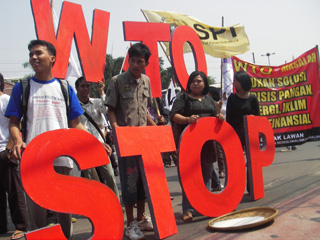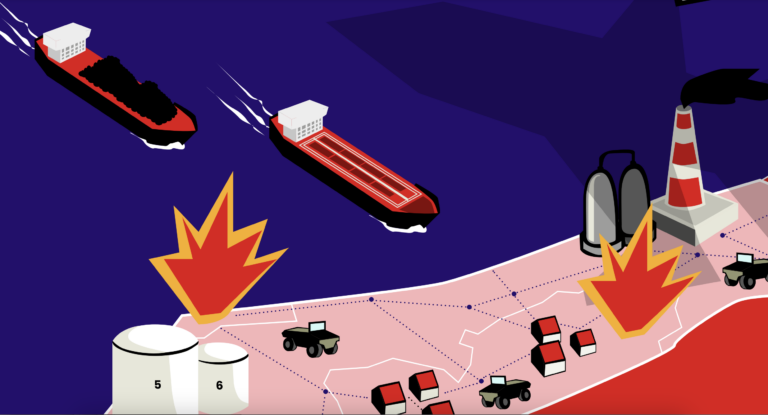
WTO the cause of global crises, not the solution
During the WTO-conference taking place this week in Geneve representatives of the global network Our World Is Not for Sale (OWINFS) from four continents showed how the trade liberalisation model still promoted by the WTO has devastated communities across the world and how it has dramatically worsened the exploitation of women, food shortages, unemployment, and the financial crisis.
Ambassador Nathan Irumba, from the Southern and Eastern African Trade Information (SEATINI) said “the neoliberal policies implemented in out countries over the part decades reinforced by the rules of the WTO have impacted negatively on our economies and lives and are also responsible for the ongoing global financial and economic crisis. If completed on the current terms, the Doha round will aggravate the problems of our economies, as it will take away the very policy instruments needed to address the current crisis and prevent similar crises in the future. African countries must therefore stand up for their interests”.
Shalmali Guttal, from Focus on Global South, said “the WTO trade regime has seriously undermined food security in developing countries by making them dependent on volatile world markets for securing their food supplies and at the same time, destroying domestic production. Subsidized imports from wealthy countries have destroyed the livelihoods of local agricultural producers, driving them deeper into debt, driving them off their lands and in many tragic cases, to take their own lives. If we want to solve the food crisis we must get the WTO out of food and agriculture.”
Myriam Vander Stichele, Center for Research on International Corporations (SOMO), said "the WTO contributed a great deal to the financial crisis by liberalizing toxic financial services, letting banks to become too big to fail and forbidding necessary regulation. The Doha round continues to pursue the same agenda, which will result in further deregulation instead of financial reform".
Graciela Rodriguez, International Gender and Trade Network (IGTN) said “the progressive liberalization of trade and investment that the neoliberal model has promoted in the last decades, has not promoted the development as promised, but instead, has been the determining cause of the current global crisis. It is the same liberalization and deregulation that has worsened the international division of labour, based on the promotion of the model of the exportation of natural resources, raw materials and energy from the countries of the South. This same international trade model has been expanding, in search of cheap labour; taking advantage of gender inequality to lower global salaries in the last decades.”
Read the Statements on financial crisis(opens in new window) of SOMO researcher Myriam Vander Stichele
Related news
-
 The hidden human costs linked to global supply chains in ChinaPosted in category:News
The hidden human costs linked to global supply chains in ChinaPosted in category:News Joshua RosenzweigPublished on:
Joshua RosenzweigPublished on: -
 The power to extract value from the value chainPosted in category:Long read
The power to extract value from the value chainPosted in category:Long read Rodrigo FernandezPublished on:
Rodrigo FernandezPublished on: -
Powering injustice Published on:
 Lydia de LeeuwPosted in category:Publication
Lydia de LeeuwPosted in category:Publication Lydia de Leeuw
Lydia de Leeuw

